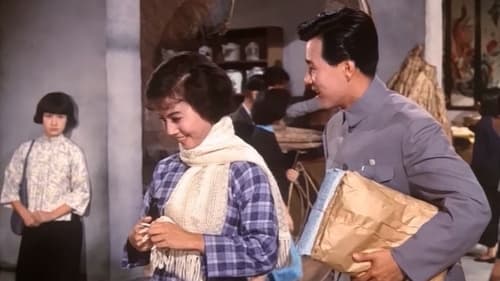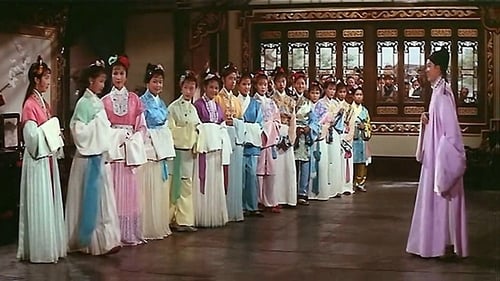
Martial arts film from Taiwan

Storm over the Yangtze River tells the true story of undercover intelligence agent "Yangtze Number One" and his colleagues in Jianli County of Hubei Province, who risk their lives to carry out the "Dead Bridge Plan" to secure the "Yangtze 180 Blockade". Li Lihua gives an iconic performance as a strong and charming agent of an intelligence unit, engaging in a risky mission to save her unit chief-cum-lover, who is regarded as a traitor but actually is a double-dealing agent against the Japanese occupation. The film garnered four awards at the 1969 Golden Horse Awards, including Best Leading Actor and Best Leading Actress.

A comical look at the preparations and anxiety associated with marriage. As a young man searches for his ideal mate, he reflects upon this madness and has second thoughts about matrimony.

Old Meng
A scholar falls for a beautiful maiden whom he invites to stay with him, but she is not what she seems to be...

Old Li
Yang Mengchi is a spoiled, rich do-nothing whose habit of smoking opium has cost him his entire fortune and the family mansion, the Garden of Repose, now due to be sold to Yao Guodong. Fearing that Yao's spoiled and unruly son Siaofu will follow in Yang's footsteps, Yao's stepwife Wan Zhaohua tries to instil discipline in the child but her efforts are undermined by the child's indulging and protective father and grandmother. Unable to reform himself despite his own son's chastisement, Yang leaves home to lead a reclusive life in a destitute temple, only helped out by his filial daughter Han'er. The poverty-stricken Yang is drafted into the army and tragedy ensues.

Hua Taishi
Tang Bohu is smitten by the stunning beauty of Qiuxiang, the maid of Grand Tutor Hua, during his visit to a monastery in Suzhou. Stalking the maid, Tang's affections are finally reciprocated with three charming smiles. To approach the fair maid, Tang seeks work in the Grand Tutor residence as a study companion, and his talents win Hua's attention. As a frustrated suitor, he turns to his resourceful friend Zhu Zhishan for help.

Hong Kong comedy film.


Chia Lei / Chia Ping (Chia Lei's brother)
On her way home from Lan Sin Restaurant, Liang Li-chin is horrified to have beheld a man's body inside a private hired-car. But when she explains what she has seen to her fiance Hu Ming-lin at his Red Bat Apartment, she is no longer sure whether it was a drunkard or a corpse. But Hu is arrested by the Police as the suspected murderer of his boss Chia Lei on certain material evidences: a/ Hu's visiting card has been found near the corpse; b/ the scarf which strangled Chia to death belongs to Hu as there are his initials M. L; and c/ he has been seen to have quarreled with Chia. But somehow Hu denies he has killed Chia. Liang now recalls that she has seen a strange figure, a man, that night in the car. She is sure he was not Hu, but the Police Inspector, is not a bit convinced, especially because of her relation with the suspect, Hu. Liang feels she must act fast, if she is going to save her fiance's neck.

Famous dancer and film actress Fong Nan (Mao Mei) desires both a career and a family after marrying an eminent doctor (Guan Shan), who, however, wants her to be a stay-at-home wife. They are on the brink of divorce when he finds out she secretly rehearses for her dance and movie…Taking inspirations from Hollywood musical films, the movie is beautifully directed and meticulously produced by Yuen Yang-an and his Sun Sun Film Enterprises. While most films at the time usually depict how grassroots people rise above adversity, this one tells the story of a famed actress who thrives for success and never gives up on her artistic ambition. This reflects that women's liberation and employment was a dominating theme in left-wing movies. The finale was shot in Eastman colour negative film, which was rare before mid-60s given the limited technical resources in Hong Kong film industry, and thus a valuable record in the city's cinematic history.

A financially struggling office worker goes into debt in order to afford traditional holiday gifts for his boss and landlord. Part of Hong Kong Film Awards' 100 Best Chinese Movies.

A Midsummer Night's Love is about a couple, Li Yuqin and Zhang Tianshi, who faked their marriage but the lies became real, unleashing a series of comic situations.

Headmaster
A 50's Chinese film that reflects the post-war society, expresses idealism and pleads to return to the homeland.

An early Drama by the Daai Wa (Da Hua) Film Company

An early Musical by the Hsin Hwa Motion Picture Company.

Smash Up (1952 film) (Chinese 蛇蝎美人) also known by the aliases: The Vicious Beauty and Destroy; is a Hong Kong drama film directed by Bu Wan-Cang and produced by Shaw Brothers Studio. It starred Bai Guang, Wong Ho and Yiu Kwang-Chao.

bandit chief
Teacher Huang San extends to his pupils the high principles of patriotism, thus arousing the hatred of the occupying Japanese. Huang is forced to flee and to escape from the Japanese clutches. One night, he helps a robber escape from a pursuing Japanese officer by firing his gun and thus unintentionally kills the Japanese. Huang San follows to his hideout and from then on, Huang San joins the bandits. Huang San attempts to rob a house but discovers that the occupant is none other than his student Wang Zhongkang who is involved with the guerrillas. Huang San decides to help Zhongkang raid the military arsenal of the enemy. However, as Huang gradually gains the trust of their chief, some jealous associates within the bandit group informs on him. Huang and Zhongkang carry out their raid amid a fierce confrontation, Zhongkang successfully implements his mission but Huang is killed in the battle.

Director

Director
Hong Kong drama.

Director
Hong Kong drama.

Director
Hong Kong drama.

Director
Hong Kong romance.

Director
Hong Kong drama.

Director
Hong Kong horror.

Director
Cantonese opera.

Director

Director

Red Heroine was a smash hit on release and a prime example of the martial arts explosion of the late 20s (setting the template for later revivals), but with a crucial twist: in place of the typical, manly hero we have a swashbuckling woman. At first she’s a helpless abductee, then an unstoppable killing machine, fighting to stop a tyrannical warlord ravaging the countryside and enslaving numerous (very) scantily-clad young women.

Director
Red Heroine was a smash hit on release and a prime example of the martial arts explosion of the late 20s (setting the template for later revivals), but with a crucial twist: in place of the typical, manly hero we have a swashbuckling woman. At first she’s a helpless abductee, then an unstoppable killing machine, fighting to stop a tyrannical warlord ravaging the countryside and enslaving numerous (very) scantily-clad young women.













